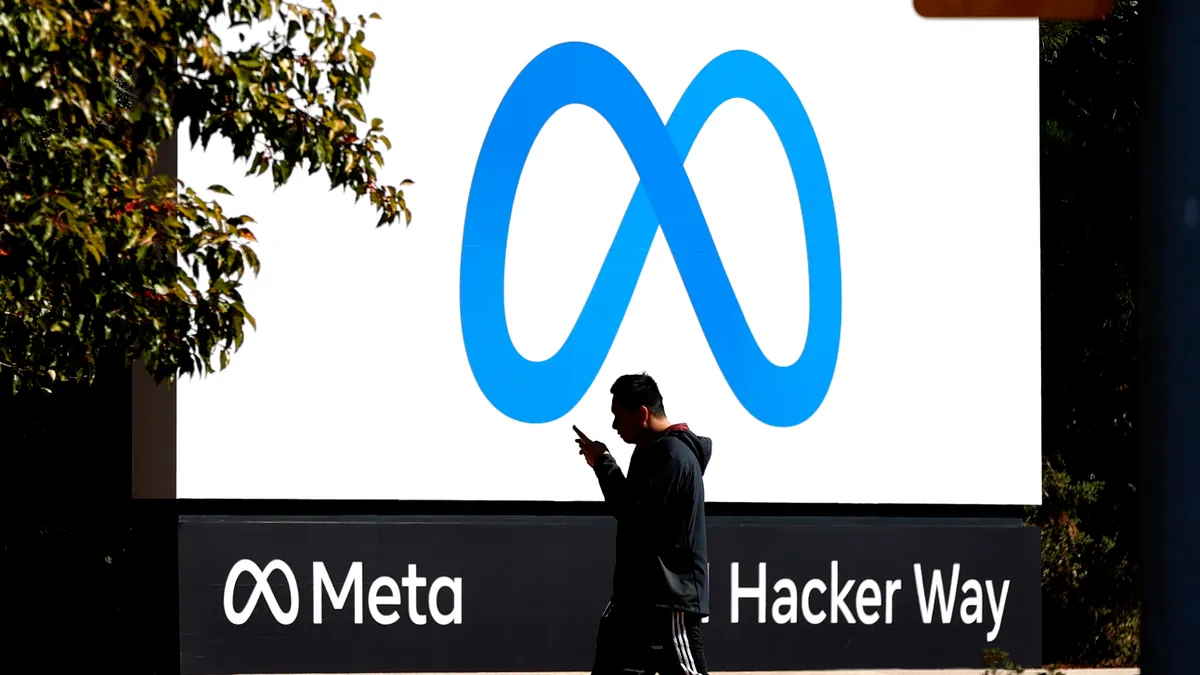Dive Brief:
- Meta Platforms’ revenue declined for the first time in its history, down 1% year-on-year to $28.8 billion in the second quarter, according to an earnings statement.
- Advertiser demand cooled during the period, with the slowdown viewed as broad-based versus affecting just a handful of categories. While ad impressions increased 15% in Q2 across the Facebook owner’s properties, the average price-per-ad fell 14%.
- Meta is focused on getting newer bets like TikTok clone Reels off the ground, but those aren’t as well-monetized as other offerings and represent costly short-term investments. Along with challenging macroeconomic factors, the company continues to feel the sting of Apple privacy changes it expects will shave off billions in revenue by year's end.
Dive Insight:
Meta reached an unwelcome milestone in Q2 as revenue declined for the first time, a sharp contrast to years of explosive growth that included major bumps earlier in the pandemic. Executives attributed the drop to foreign exchange rate fluctuations and said revenue was up 3% on a constant-currency basis. Still, it’s hard not to see the results, which missed analyst expectations, as a sign that a bevy of internal and external challenges are fast chipping away at the company’s once-Teflon armor.
Meta’s mandates are well established. It is racing to build Reels into a viable competitor to TikTok, which has handily won the minds of Gen Z and become the fastest-growing social app. Changes Apple made to user-tracking a year ago have pushed the firm to rethink substantial aspects of its ads infrastructure and delivered a consistent blow to revenue. And an ambitious play around the metaverse continues to guide strategic bets but remains costly and far-off from realization.
All of these hurdles appeared pronounced in a macroeconomic environment marked by soaring inflation and recessionary fears. Other digital ad platforms, including Google, Snapchat and Twitter, have been roiled by the volatility.
“Advertising revenue growth slowed throughout the second quarter as advertiser demand softened,” said David Wehner, Meta’s chief financial officer, on a call discussing the results with analysts.
“The deceleration has been broad-based across verticals, and we believe businesses are lowering their advertising spend in response to the increased economic uncertainty,” Wehner added. He will shift to the role of chief strategy officer moving forward, with Susan Li taking on the CFO mantle.
Reels remains a leading agenda item and has crossed a $1 billion annual revenue run rate, executives said. That figure is higher than what Stories saw at the same point in its development. But Reels is more complex than Stories, driven by an algorithmic feed of short-form video that can require a high lift to produce. The square focus on onboarding users and brands to the product could also be siphoning off activity from more mature, proven formats.
“Reels doesn't yet monetize at the same rate as feed or Stories, so in the near term, the faster that Reels grows, the more revenue that actually displaces from higher-monetizing surfaces,” said Meta CEO Mark Zuckerberg on the earnings call. “In theory, we could mitigate this short-term headwind by pushing less hard on growing Reels, but that would be worse for our products and business longer term since we're confident that Reels will grow engagement overall and quality will eventually monetize closer to feed.”
Instagram has recently received flak for changes to the feed experience that prioritize video and posts from accounts the user doesn’t follow.
Looking ahead, Reels aims to ramp up ad load, improve performance and make ads easier to create. Other ad products called out included Click-to-Message, where users tap an ad to open a chat with businesses on Messenger, Instagram or WhatsApp. Paramount recently leveraged the feature to promote “Top Gun: Maverick,” one of the summer’s box office hits. About 40% of advertisers have adopted the format.
“Click-to-Message is already a multi-billion dollar business for us, and we continue to see strong double-digit year-over-year growth,” said Chief Operating Officer Sheryl Sandberg in her final earnings call for the company. The veteran executive announced her resignation in June.
Elsewhere, Meta recently revealed it would slow hiring initiatives and the pace of investments on some of its bets, aligning with how other tech giants have reacted to a tightening economy.














